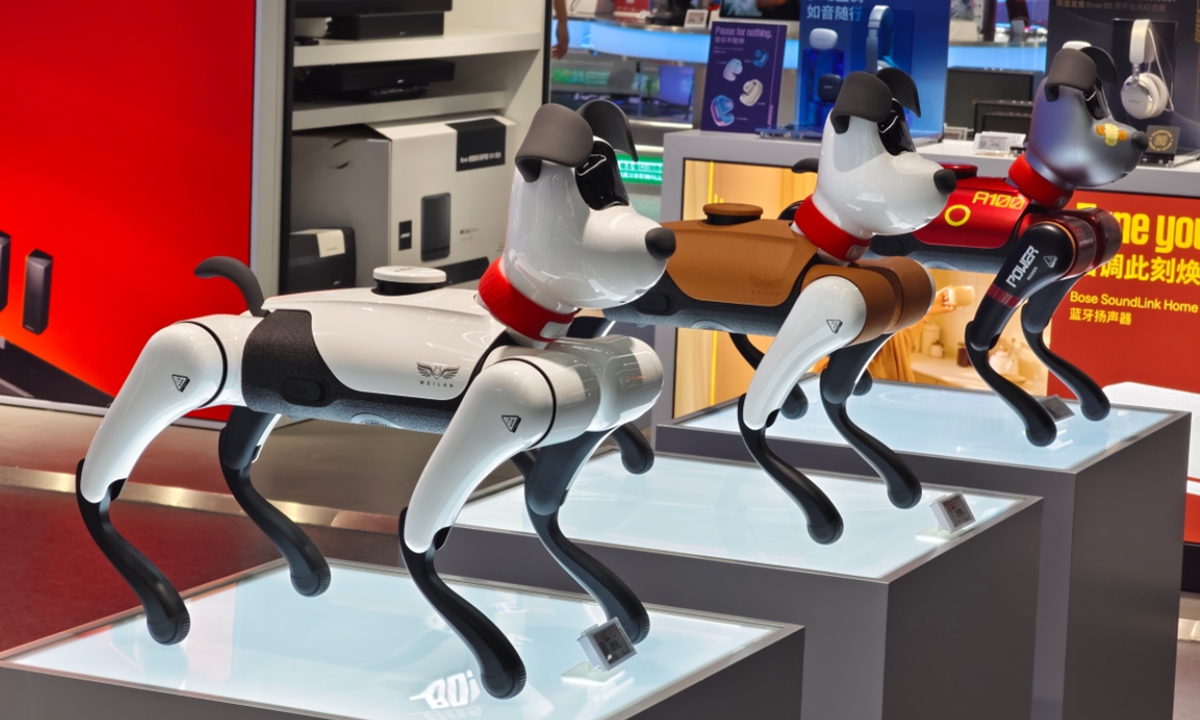
Several Alpha robot dogs manufactured by Weilan are on display at a shopping mall in Wuhan, Central China’s Hubei Province April 18, 2025. Photo: VCG
China is experiencing rapid growth in its artificial intelligence (AI) sector and now holds 60 percent of the world’s AI patents, the most globally, according to a World Intellectual Property Organization (WIPO) report, Shen Changyu, head of the National Intellectual Property Administration (NIPA), said at a State Council press briefing on Thursday.
In recent years, the NIPA has actively responded to the evolving needs of AI-related sectors by advancing institutional innovation in intellectual property (IP), Shen said. This includes timely revisions to the patent examination standards, the release of a guide for AI-related patent applications, and addressing key issues such as eligible applicants, protectable subject matter and examination standards. NIPA has also provided fast-track services for patents in core AI fields and cracked down on malicious trademark filings like those involving “DeepSeek,” reinforcing IP protection to support AI innovation.
He added that China is also accelerating the adoption of AI technologies within the IP system itself, driving the digital and intelligent transformation of IP governance and steadily improving overall efficiency and capability.
Ma Jihua, a veteran telecom industry analyst, told the Global Times on Thursday that China’s emergence as the world’s top holder of AI patents reflects its growing strength in technological innovation.
“It demonstrates a stronger foundation for upgrading Chinese manufacturing, greater influence in shaping international AI standards, and a significantly improved ability to withstand external tech restrictions and challenges,” he said.
Although a latecomer to the AI race, China has advanced in step with global trends, backed by a surge in engineering talent and strong R&D investment from companies — factors that helped accelerate breakthroughs in the field, according to Ma.
China’s vast market has driven a rapid AI adoption across sectors. Strong government backing and fierce industry competition have further pushed companies to strengthen IP strategies, both to gain an edge and to guard against global challenges.
Despite US efforts to curb China’s AI rise — most notably through export controls on high-end NVIDIA chips, China’s AI sector remains on a rapid growth trajectory. Ma attributed this resilience to the country’s solid industrial foundation and a shift toward self-reliance, which has accelerated breakthroughs in both software and hardware.
Ma observed that while the restrictions have caused short-term disruptions, they’ve also fueled innovation. Chinese firms are developing efficient models like DeepSeek and advancing domestic chip capabilities, paving the way for a more independent, China-led AI ecosystem that could reshape the global landscape.

